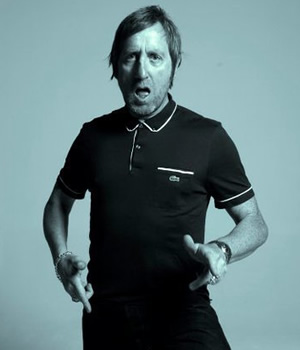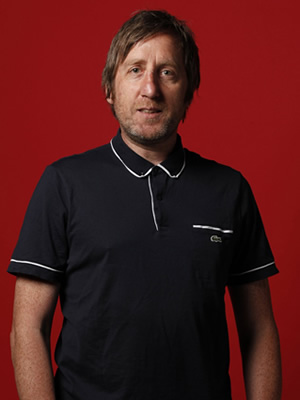
Circuit Training 38: Michael Smiley's People

He's been a ravey cycle courier in Spaced, a computer geek in Luther and now a jobbing hitman in the highly acclaimed new Britflick Kill List. Michael Smiley is a proper, busy, versatile actor these days, but, hey, this isn't America, so he's still banging away at the stand-up too, 18 years after his first gig, and 28 years after popping over to London from his native Northern Ireland for a few months. Let's kick off with the fillum though...
Kill List is getting rave reviews - and also freaking people out. How do you describe it to people?
The hard thing about it is to describe it without giving away too much, you need to know very little about it to enjoy it, you don't want to spoil it. So many films these days are spoiled by bad journalism, journalists who just to describe things, it's just laziness. People spend a lot of time to see a film, and sometimes if they've read a review they might as well not bother going at all.
The brief outline, its the story of a man who's an ex soldier who was a sniper during the Iraqi campaign and Afghanistan, Kosovo - him and his partner have gone into private security and become hit men basically. Its a job like any other job, it's been hit by the downturn, the economic depression, he hasn't worked in eight months and his last job had been a bit disastrous. He's being pushed into work again, and his best friend - I play Gal, his spotter -we're given a contract, a list of people to go and kill, we go meet the client, get the contract and it spirals out of control.
It's hard to fit it into a genre. The director has written it as a horror, but it's a thriller as well. It's not horror like Final Destination where you're shocked and jump out of your seat, none of that happens, it just has a growing sense of foreboding about it.
It's good to see a British film take some risks: a lot of them seem unashamedly aimed at American audiences nowadays, with all local references removed...
The other side of that coin, Americans don't do that for the British market. I'm a massive fan of The Wire, and The Wire didn't give you any information, didn't give you any apologies. As soon as you start watching it, it's like this was a process that was already happening, and it's up to you to catch up - 'I've got to recalibrate my head a bit quicker here.' That's what was so brilliant for me, that it wasn't pandering to the lowest common denominator, and good cinema should be that too.

Our director [Ben Wheatley], he's pandering to the clever people rather than the stupid people for a change. People who want more deserve more - if you want more from a film you deserve it more. You can spend £15 going to the cinema sometimes, this film that cost so many million, and you come out afterwards thinking 'that 90 minutes, I'm never gonna get back, what a waste of bloody time.' At least with this you're not gonna do that.
Did you always want to be an actor, or was it just through knowing other comics who'd started doing it?
When I got into stand-up it was pretty much just storytelling, long stories that I'd edit down to make them palatable to a stand-up audience. Then I was living with Simon Pegg, and Nick Frost, other comedians would come and stay with us. We'd sit around and have a drink of an evening and tell stories, having a laugh, and people would say 'why aren't you doing that on stage?' 'It's too long-winded, people wouldn't be interested.' So they said 'why don't you go up to Edinburgh?'
So I plucked up the courage, took a show to Edinburgh called Confessions of a Catholic Buddhist, which then became a trilogy of storytelling plays. The second one was about a cycle courier, so was completely character based, a Becket-esque Waiting for Godot type of thing, a cycle courier waiting for a job that he was getting too old for. Then the third one was called The Parting Glass, about a guy left behind at a wake. That's where the acting came from, they became more dramatic and character based, and that's where I got the bug, being on stage and not being afraid of the silence.
A lot of comics find that transition difficult, the lack of immediate feedback...
When you're a stand-up if they're not laughing for 10 seconds you think 'oh god, I've lost the audience,' but this wasn't about that, you could tell a story. I really enjoyed that side of it. Then Simon and Jessica [Stevenson, now Hynes] started writing Spaced, and, you know Tyres, they wrote Tyres based on my time as a cycle courier and a raver. Simon said 'I've written this character that's basically you. Do you wanna play you?' and I went 'Yep!'
What were your next jobs after Tyres?
I got a couple of little parts on [Al Murray's sitcom] Time Gentleman Please, then my first straight thing was a spin-off from The Bill called Burnside, where I played a crackhead alcoholic pimp on a cross-channel ferry who takes the barmaid hostage because she won't serve him another drink, he takes her hostage with a semi automatic. That was a great job, that.
Is it not a bit odd, finding out that you're the perfect man to play a crackhead alcoholic pimp?
I've played loads of different types of characters but that's the brilliant thing about acting. In stand-up you're pretty much being yourself: the audience changes, you develop new bits of material, the venue changes, but you really don't change. It's just you.

Whereas with acting it's a completely different thing each time, even if they ask you to do the same shit all the time, it's still different, even someone who's been typecast. It's still different stuff, different clothes, a different environment, that's what makes acting really exciting, and that's why I like doing straight acting as well as comedy acting.
I'm very lucky, I'm being offered scripts and going for meetings that are really interesting. I've not been asked to be a terrorist, I've never been stereotyped in that way, 'The Irishman' - there's been no racial stereotypes for me. Benny in Luther isn't a Northern Irish guy really, the same with Kill List: there's a dinner party reference to me being Northern Irish but that's about it. I really like that, it's accepted, the fact that the world is multi-racial and multi-cultural.
Do you have other films on the go then?
There's a few little things coming out. In a couple of weeks I'm going up to the highlands to film a thing called Shelter. I'm not playing any of the leads in it but it's a coming of age sort of piece about a girl and a dad living at a petrol station on a road in the highlands, she's sexually coming of age and the dad's an epileptic. It looks like it could be set in the Midwest of America, a slow study. I play a character that turns up.
On the other side of the coin I play Jason Byrne's best mate in his new radio sitcom, a really angry Belfast barman, then a few other feature films that I can't really talk about. So I've got a busy year ahead - next year I'm doing another film with Ben Wheatley called I Macrobane with Nick Frost. I'm playing another hitman, called George Clooney. As far as stereotypes go, hitman seems to be the pattern for the moment.
Wheatley writes his scripts with his wife, Amy Jump. Have you ever tried collaborating with your better half (the journalist Miranda Sawyer)?
Oh no, me and my wife have never written together, that wouldn't work, we're both solitary when it comes to that sort of thing [Miranda shouts her agreement]. She wouldn't write with me. A couple of times we've laughed at the idea - 'why don't we do something' - but it's hard enough with one doing the dishes while the other's doing the dinner, we want to kill each other. To actually sit down and try to write a script together, a police siren would go off, helicopter overhead, hostages taken... and the hostage taken would be me, I'd be crying and sitting in the corner, while she had a gun to my head.
So, no, we don't need to, she's already talented as a writer, she doesn't need me mucking up her stuff.
Any big plans stand-up wise?
I'm working on a one man show called The Immigrant, which is two thirds of the way finished, hopefully pencilled in for the Soho Theatre at some stage, it's about leaving Ireland and ending up in London, a couple of lovely reveals in it. It's chronological, semi autobiographical and storytelling, which is pretty much what I always do.
Help us publish more great content by becoming a BCG Supporter. You'll be backing our mission to champion, celebrate and promote British comedy in all its forms: past, present and future.
We understand times are tough, but if you believe in the power of laughter we'd be honoured to have you join us. Advertising doesn't cover our costs, so every single donation matters and is put to good use. Thank you.
Love comedy? Find out more